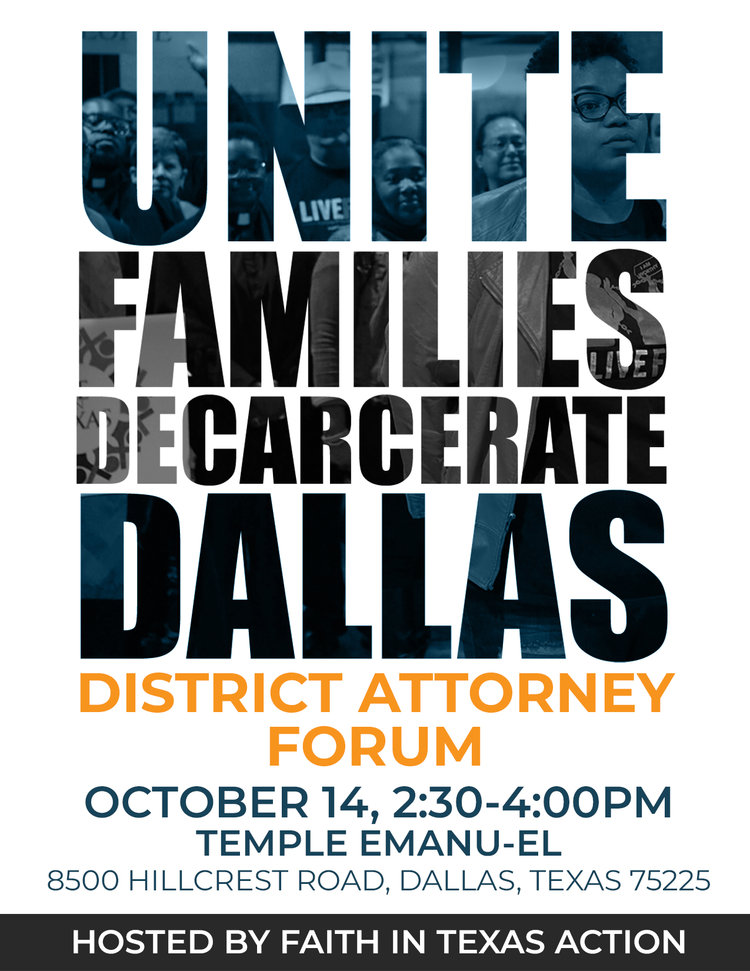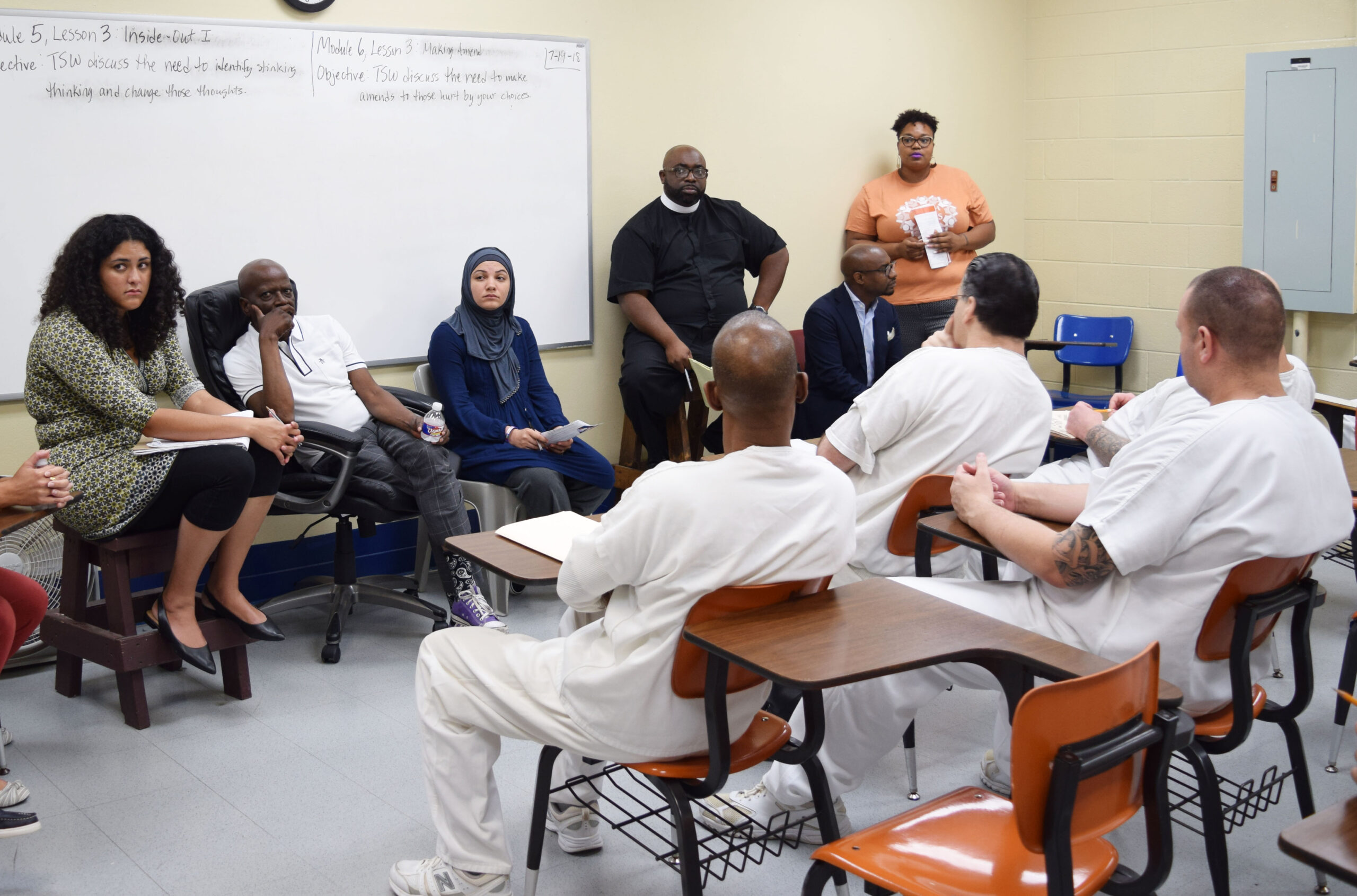The District Attorney is the most powerful public official in the Dallas criminal justice system. Faith in Texas Action will host a community forum where we will share our vision for a just community and hear the candidates’ plans and policy ideas to create a more restorative, equitable criminal justice system. Join us for an afternoon of freedom and unity, as we ask our district attorney candidates to commit to our vision of uniting families and decarcerating Dallas!
FAITH IN TEXAS LEADERSHIP TRANSITION
FOR IMMEDIATE RELEASE: October 3, 2018 Dear Faith in Texas Family, Due to strategic differences, the Faith in Texas Board of Directors has moved to transition its co-directors, Dr. Lydia Bean and Rev. Edwin Robinson, out of the organization and pursue new leadership. We sincerely thank Dr. Bean and Rev. Robinson for their commitment to service and justice during their respective tenures with Faith in Texas and wish them well in their future endeavors. We will soon begin a comprehensive strategic organizational review and national search for a new executive director. In the meantime, the board has appointed Akilah S. Wallace as interim executive director. Akilah previously served as the Faith in Texas development director and we have the utmost confidence in her ability to keep the organization moving forward during this critical time. During this transition, the Faith in Texas board, staff, clergy leaders, and national partners are increasingly committed to the organization’s success, and remain acutely focused on the work to achieve our vision of just, equitable, inclusive and faithful communities. We optimistically look forward to this new beginning for the organization, ripe with fresh strategies, clearer focus, renewed energy and rejuvenated faith. We understand that you may have questions; please do not hesitate to reach out with any concerns. Email Board President Gordon Martinez at boardpresident@faithintx.org. Please direct any media inquiries to Lola Vinson, the Faith in Texas communications director, at lvinson@faithintx.org. Thank you for your commitment to justice and your continued support of Faith in Texas. In solidarity, The Faith in Texas Board of Directors
Tisha B’Av: God in Chains
I began my observance of Tisha B’Av early this year. Tisha B’Av, the 9th of Av, is a day when we mourn the Temple’s destruction and other calamities befallen our people. We attune to the brokenness in our world, our lives, our bodies. It is the beginning of teshuvah, the process of turning and returning that we seek to complete at the spiritual height of Yom Kippur. Yesterday, twenty clergy from diverse backgrounds gathered at City Temple Seventh Day Adventist Church in South Dallas. We were joined together through our involvement with Faith in Texas, a multi-faith, multiracial organization committed to racial and economic justice. After detailed instructions and a moment of prayer, we climbed into the thirty passenger bus and drove to Venus, Texas. We passed through open farm country until suddenly I spotted on the horizon a sprawling facility that looked like a large warehouse. We had arrived at the minimum security Sanders Estes Prison. This unit has around 1000 inmates and is operated by a private company called Management and Training Corporation. MTC operates prisons for the state of Texas as well as a dozens of other facilities across the country, all with the mission to prepare inmates for successful re-entry through a host of programs. I began my observance of Tisha B’Av in Venus, Texas, miles and worlds away from the service that will take place here tomorrow evening. And yet, the experiences are in fact joined by our sacred duty to face the brokenness that exists both within and around us. And by brokenness I mean that our country fails to uphold its moral responsibility when a massive amount of resources go to sending poor people to jail instead of resources invested back into the community, into schools and drug rehab programs. This is best illustrated through the following story in the book The New Jim Crow by Michelle Alexander: Imagine you are Emma Faye Stewart, a thirty-year-old, single African-American mother of two who was arrested as part of a drug sweep in Hearne, Texas. All but one of those people arrested were African-American. You are innocent. After a week in jail, you have no one to care for your two small children and are eager to get home. Your court-appointed attorney urges you to plead guilty to a drug distribution charge, saying the prosecutor has offered probation. You refuse, steadfastly proclaiming your innocence. Finally, after almost a month in jail, you decide to plead guilty so you can return home to your children. Unwilling to risk a trial and years of imprisonment, you are sentenced to ten years’ probation and ordered to pay $1,000 in fines, as well as court and probation costs. You are also now branded a drug felon. You are no longer eligible for food stamps; you may be discriminated against in employment; you cannot vote for at least twelve years; and you are about to be evicted from public housing. Once homeless, your children will be taken away from you and put in foster care. A judge eventually dismisses all cases against the defendants who did not plead guilty. At trial, the judge finds that the entire sweep was based on the testimony of a single informant who lied to the prosecution. You, however, are still a drug felon, homeless, and desperate to regain custody of your children. I began my observance of Tisha B’Av in Venus, Texas. Granted, this was a four star unit, as far as prisons go. They have a Prison Entrepreneurship Program which challenges participants to be better partners, fathers and community members. Several inmates have gone on to start their own businesses. There is the P.A.W.S of Hope program which rescues dogs from shelters, trains them and then connects the dogs to families who adopt loving, happy furry companions. As I witnessed, the inmates open up to their canine friends and take great pride in their work. And yet, despite these amazing rehabilitation programs, it is still a prison. There were no windows looking out on trees. All the inmates wore the same white uniform with facial hair, tattoos and skin color the external indicators of individuality. And though fellow inmates can become a kind of family, the majority of men have partners, children, parents and friends who feel their absence with each passing day, and vice versa. From a Jewish perspective, according to our traditional texts, restitution, rather than punishment, is the goal. Incarceration–this is what the “other nations” do, for example, when Joseph was held in an Egyptian jail. The limitation of an individual’s mobility and ability is seen as a potential hindrance to the work of teshuva. Plus, we are instructed to see a person who has done the work of rehabilitation as entering his or her life with restored wholeness. Checking a box when seeking housing or a job is a continued reminder of a past offense, pegging a person as tainted, and not inherently filled with future potential. Now I want to be clear, our sources state we need to follow the law of the land in which we reside. Breaking the law must have consequences and some of the men are deeply troubled and misguided. Perhaps for some, no amount of rehabilitation could change their ways. However, many inmates are determined to turn their lives around. I met one young man pursuing his GED. Growing up with dyslexia, he never experienced the support needed to help him succeed. Starting in seventh grade he would just walk by his school in the mornings. Nobody cared, nobody noticed. Until now. A retired DISD teacher with a warm and calm demeanor is working with his learning challenges and cheering him on. Why must it take entering prison for a bright young man to find the resources and concern necessary for him to succeed? Here right before me was living evidence of the phenomena we call the school to prison pipeline, one main cause of mass incarceration in our country. If you



